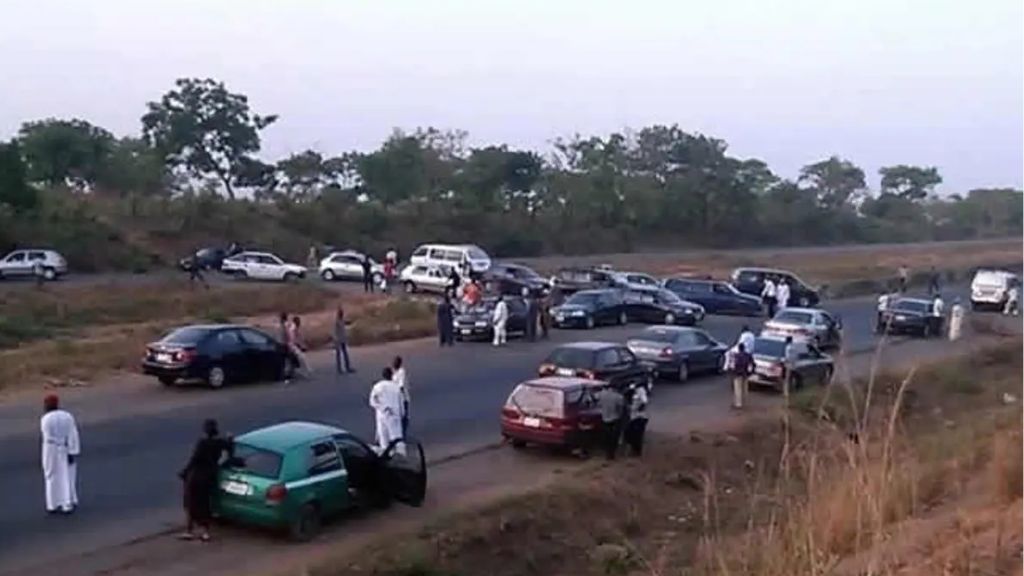Gunmen have abducted 20 passengers from two commercial buses along the Adoka-Naka-Makurdi Road in Benue State, adding to the growing wave of violent attacks plaguing Nigeria’s north-central region.
The incident occurred approximately three kilometers from Naka, the administrative center of Gwer West Local Government Area, an area notorious for kidnappings and armed assaults. According to eyewitnesses, the attackers ambushed two vehicles—a Toyota Picnic and a Volkswagen Sharon—each carrying nine and ten passengers, including the drivers.
A commercial driver, who spoke anonymously, confirmed the abduction and stated that both vehicles were intercepted in quick succession.


Yakubu Onu, Secretary of the National Union of Road Transport Workers (NURTW), High-Level Unit in Makurdi, confirmed that the two buses belonged to members of the union. He revealed that the first vehicle, traveling from Makurdi to Lokoja, was ambushed near Naka.
“Six passengers were taken into the bush by the attackers. Three passengers and the driver were left behind and later reported the incident to the police in Naka,” Onu said.
The second vehicle, coming from Ankpa in Kogi State en route to Makurdi, was attacked at the same spot. Eight passengers were reportedly abducted from that bus as well.
Traditional ruler of Naka, His Royal Highness Daniel Abomtse, also confirmed the incident, stating that some victims—including an elderly woman, a breastfeeding mother, a few children, and one of the drivers—were spared.
“The attack occurred at Okpa, near Adoka, a border area of Gwer West. This region is riddled with ungoverned spaces where criminal groups operate freely,” the monarch noted.
Widening Crisis Across the Region
The abduction is part of a broader security crisis engulfing Nigeria’s north-central region, which includes Benue, Plateau, Kogi, Kwara, Nasarawa, Niger, and the Federal Capital Territory (FCT). These states have seen a surge in violent crimes including banditry, inter-communal clashes, and terrorist attacks.


In Plateau State, over 50 people were killed in Zikke village, Bassa LGA, on April 14 during an overnight assault by unidentified gunmen. In Benue, at least 56 people were reportedly massacred in coordinated attacks on Logo and Gbagir communities, allegedly by armed herders.
In a separate attack earlier this month, gunmen killed two people and abducted 13 passengers near the Otukpo Burnt Bricks area in Benue.
Emergence of New Terror Groups
The security situation is further complicated by the rise of new militant groups. One such faction, known as the Mahmuda Group, is reportedly establishing territorial control across rural areas in Kwara and Niger states. Operating with a mix of ideological extremism and military tactics, the group has taken over villages in Kaiama, Baruten, and parts of Borgu LGA, planting flags, extorting locals, and enforcing Sharia-style laws.
“They’ve moved beyond banditry,” a local source said. “This is now governance by force. They regulate farming, enforce moral codes, and settle disputes—they’ve created a parallel government.”
The group is believed to be a splinter faction from Boko Haram, originally tied to the Shekau-led wing. They were expelled from Mokwa LGA years ago and have since taken refuge in the dense forests of Kainji Lake National Park, which spans nearly 4,000 sq. km.

Federal Government Reacts
In response to the worsening situation, President Bola Ahmed Tinubu has ordered a complete overhaul of the nation’s security architecture. Following a high-level meeting with security chiefs on April 23, Tinubu demanded swift and decisive action to end the violence.
“Enough is enough,” the President declared, condemning the continued killing of innocent Nigerians in Benue, Borno, Plateau, and other states.
National Security Adviser (NSA) Nuhu Ribadu briefed journalists after the meeting, stating that Tinubu issued fresh directives aimed at intensifying counter-terrorism and security coordination across troubled regions.
“He has given clear instructions. He was even monitoring the situation while abroad and kept issuing directives,” Ribadu revealed.
Ribadu said the security team had visited Benue, Borno, and Plateau to assess the situation on the ground and to meet with state authorities as directed by the president.
State Governments Also Respond
In the wake of escalating attacks, Niger State Governor Umaru Mohammed Bago imposed a dusk-to-dawn curfew in Minna. The order restricts movement between 6 p.m. and 6 a.m., with exceptions only for medical emergencies. Commercial motorcycles and tricycles have also been banned during curfew hours.
This sweeping response underscores the gravity of the situation and the urgent need for both federal and state governments to intensify efforts to restore peace and security in Nigeria’s most vulnerable regions.




